口语点津:情态动词can't 的10个习惯表达
- 格式:doc
- 大小:179.50 KB
- 文档页数:4
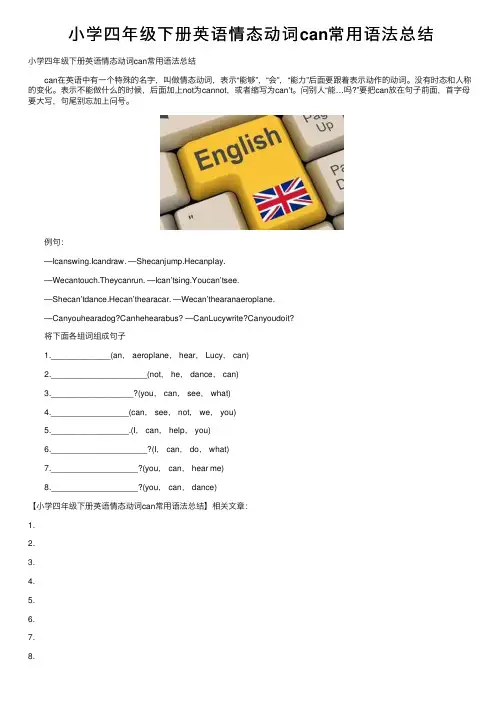
⼩学四年级下册英语情态动词can常⽤语法总结⼩学四年级下册英语情态动词can常⽤语法总结 can在英语中有⼀个特殊的名字,叫做情态动词,表⽰“能够”,“会”,“能⼒”后⾯要跟着表⽰动作的动词。
没有时态和⼈称的变化。
表⽰不能做什么的时候,后⾯加上not为cannot,或者缩写为can’t。
问别⼈“能…吗?”要把can放在句⼦前⾯,⾸字母要⼤写,句尾别忘加上问号。
例句: —Icanswing.Icandraw. —Shecanjump.Hecanplay. —Wecantouch.Theycanrun. —Ican’tsing.Youcan’tsee. —Shecan’tdance.Hecan’thearacar. —Wecan’thearanaeroplane. —Canyouhearadog?Canhehearabus? —CanLucywrite?Canyoudoit? 将下⾯各组词组成句⼦ 1._____________(an, aeroplane, hear, Lucy, can) 2._____________________(not, he, dance, can) 3.__________________?(you, can, see, what) 4._________________(can, see, not, we, you) 5._________________.(I, can, help, you) 6._____________________?(I, can, do, what) 7.___________________?(you, can, hear me) 8.___________________?(you, can, dance)【⼩学四年级下册英语情态动词can常⽤语法总结】相关⽂章:1.2.3.4.5.6.7.8.。
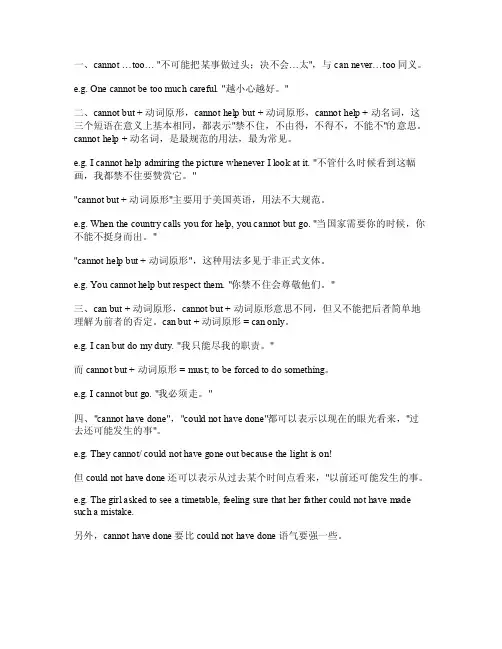
一、cann ot …t oo… "不可能把某事做过头;决不会…太",与ca n nev er…to o同义。
e.g. Onecanno t betoo m uch c arefu l. "越小心越好。
"二、canno t but + 动词原形,ca nnothelpbut +动词原形,cann ot he lp +动名词,这三个短语在意义上基本相同,都表示"禁不住,不由得,不得不,不能不"的意思。
can not h elp +动名词,是最规范的用法,最为常见。
e.g.I can not h elp a dmiri ng th e pic turewhene ver I look at i t. "不管什么时候看到这幅画,我都禁不住要赞赏它。
""canno t but + 动词原形"主要用于美国英语,用法不大规范。
e.g. When thecount ry ca lls y ou fo r hel p, yo u can not b ut go. "当国家需要你的时候,你不能不挺身而出。
""cann ot he lp bu t + 动词原形",这种用法多见于非正式文体。
e.g. Youcanno t hel p but resp ect t hem."你禁不住会尊敬他们。
"三、canbut +动词原形,cann ot bu t + 动词原形意思不同,但又不能把后者简单地理解为前者的否定。
can but+ 动词原形 = c an on ly。
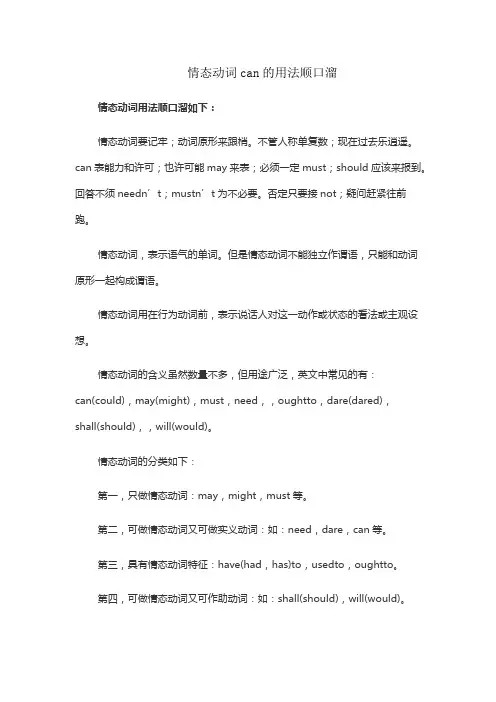
情态动词can的用法顺口溜情态动词用法顺口溜如下:情态动词要记牢;动词原形来跟梢。
不管人称单复数;现在过去乐逍遥。
can表能力和许可;也许可能may来表;必须一定must;should应该来报到。
回答不须needn’t;mustn’t为不必要。
否定只要接not;疑问赶紧往前跑。
情态动词,表示语气的单词。
但是情态动词不能独立作谓语,只能和动词原形一起构成谓语。
情态动词用在行为动词前,表示说话人对这一动作或状态的看法或主观设想。
情态动词的含义虽然数量不多,但用途广泛,英文中常见的有:can(could),may(might),must,need,,oughtto,dare(dared),shall(should),,will(would)。
情态动词的分类如下:第一,只做情态动词:may,might,must等。
第二,可做情态动词又可做实义动词:如:need,dare,can等。
第三,具有情态动词特征:have(had,has)to,usedto,oughtto。
第四,可做情态动词又可作助动词:如:shall(should),will(would)。
情态动词有一定的词义,但并不完整,必须与动词原形一起构成谓语(后面加动词原形)。
情态动词具有助动词作用,可以用来构成否定句,疑问句及用于简单回答。
情态动词无人称和数的变化。
无论人称是什么,情态动词和后面的动词都不会发生任何变化。
情态动词本身无法做谓语,需要和后面的动词一起做谓语。
所以后面的动词是原形,也无任何变化。
否定式构成是在情态动词后面加"not"。
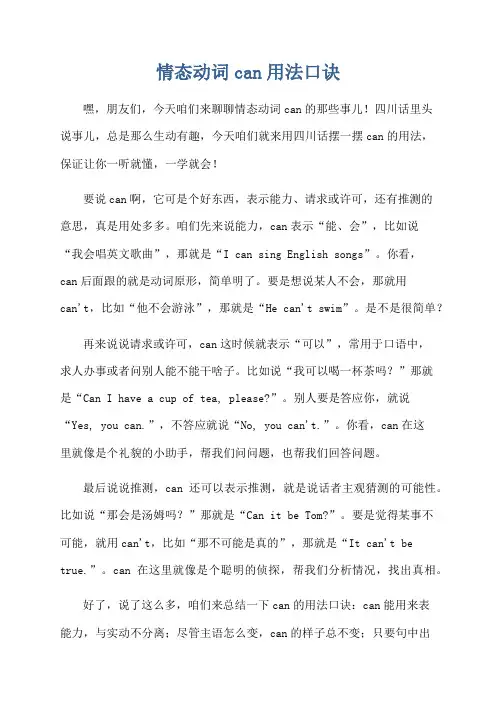
情态动词can用法口诀嘿,朋友们,今天咱们来聊聊情态动词can的那些事儿!四川话里头说事儿,总是那么生动有趣,今天咱们就来用四川话摆一摆can的用法,保证让你一听就懂,一学就会!要说can啊,它可是个好东西,表示能力、请求或许可,还有推测的意思,真是用处多多。
咱们先来说能力,can表示“能、会”,比如说“我会唱英文歌曲”,那就是“I can sing English songs”。
你看,can后面跟的就是动词原形,简单明了。
要是想说某人不会,那就用can't,比如“他不会游泳”,那就是“He can't swim”。
是不是很简单?再来说说请求或许可,can这时候就表示“可以”,常用于口语中,求人办事或者问别人能不能干啥子。
比如说“我可以喝一杯茶吗?”那就是“Can I have a cup of tea, please?”。
别人要是答应你,就说“Yes, you can.”,不答应就说“No, you can't.”。
你看,can在这里就像是个礼貌的小助手,帮我们问问题,也帮我们回答问题。
最后说说推测,can还可以表示推测,就是说话者主观猜测的可能性。
比如说“那会是汤姆吗?”那就是“Can it be Tom?”。
要是觉得某事不可能,就用can't,比如“那不可能是真的”,那就是“It can't be true.”。
can在这里就像是个聪明的侦探,帮我们分析情况,找出真相。
好了,说了这么多,咱们来总结一下can的用法口诀:can能用来表能力,与实动不分离;尽管主语怎么变,can的样子总不变;只要句中出现can,动词原形后边站;一般疑问can提前,否定can后要舔not。
你看,这个口诀简单明了,把can的用法都说清楚了。
以后遇到can,咱们就不怕了,直接用口诀来搞定它!怎么样,朋友们,今天咱们摆的can的用法,你们听明白了吗?要是还有啥子不清楚的,尽管来问我,咱们一起摆一摆,直到你搞懂为止!。
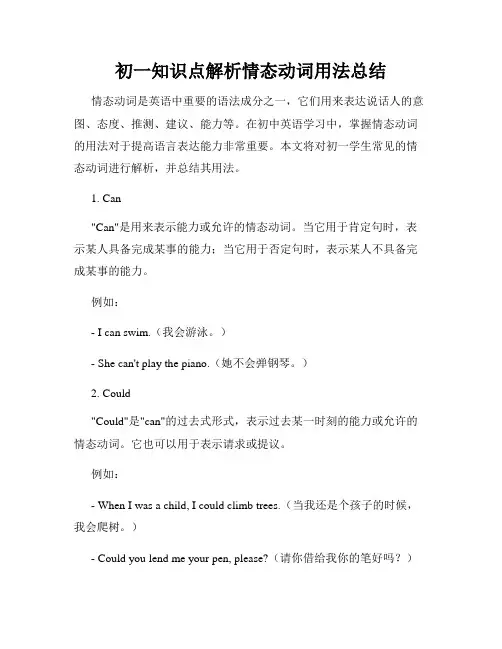
初一知识点解析情态动词用法总结情态动词是英语中重要的语法成分之一,它们用来表达说话人的意图、态度、推测、建议、能力等。
在初中英语学习中,掌握情态动词的用法对于提高语言表达能力非常重要。
本文将对初一学生常见的情态动词进行解析,并总结其用法。
1. Can"Can"是用来表示能力或允许的情态动词。
当它用于肯定句时,表示某人具备完成某事的能力;当它用于否定句时,表示某人不具备完成某事的能力。
例如:- I can swim.(我会游泳。
)- She can't play the piano.(她不会弹钢琴。
)2. Could"Could"是"can"的过去式形式,表示过去某一时刻的能力或允许的情态动词。
它也可以用于表示请求或提议。
例如:- When I was a child, I could climb trees.(当我还是个孩子的时候,我会爬树。
)- Could you lend me your pen, please?(请你借给我你的笔好吗?)"May"用来表示许可、请求或建议,也常用于表示可能性。
例如:- May I go to the bathroom?(我可以去洗手间吗?)- You may want to consider studying harder.(你可能需要考虑更加努力学习。
)4. Might"Might"是"may"的过去式形式,用来表示过去某一时刻的可能性;也可用于表示虚拟语气。
例如:- It might rain later.(后面可能会下雨。
)- If I had studied harder, I might have passed the test.(如果我学得更努力些,我可能会通过考试。
)5. Must"Must"表示义务、必须以及推测的一种情态动词。
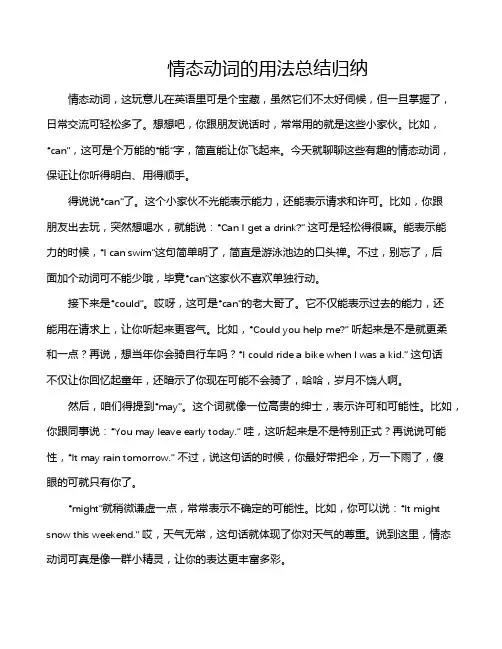
情态动词的用法总结归纳情态动词,这玩意儿在英语里可是个宝藏,虽然它们不太好伺候,但一旦掌握了,日常交流可轻松多了。
想想吧,你跟朋友说话时,常常用的就是这些小家伙。
比如,“can”,这可是个万能的“能”字,简直能让你飞起来。
今天就聊聊这些有趣的情态动词,保证让你听得明白、用得顺手。
得说说“can”了。
这个小家伙不光能表示能力,还能表示请求和许可。
比如,你跟朋友出去玩,突然想喝水,就能说:“Can I get a drink?” 这可是轻松得很嘛。
能表示能力的时候,“I can swim”这句简单明了,简直是游泳池边的口头禅。
不过,别忘了,后面加个动词可不能少哦,毕竟“can”这家伙不喜欢单独行动。
接下来是“could”。
哎呀,这可是“can”的老大哥了。
它不仅能表示过去的能力,还能用在请求上,让你听起来更客气。
比如,“Could you help me?” 听起来是不是就更柔和一点?再说,想当年你会骑自行车吗?“I could ride a bike when I was a kid.” 这句话不仅让你回忆起童年,还暗示了你现在可能不会骑了,哈哈,岁月不饶人啊。
然后,咱们得提到“may”。
这个词就像一位高贵的绅士,表示许可和可能性。
比如,你跟同事说:“You may leave early today.” 哇,这听起来是不是特别正式?再说说可能性,“It may rain tomorrow.” 不过,说这句话的时候,你最好带把伞,万一下雨了,傻眼的可就只有你了。
“might”就稍微谦虚一点,常常表示不确定的可能性。
比如,你可以说:“It might snow this weekend.” 哎,天气无常,这句话就体现了你对天气的尊重。
说到这里,情态动词可真是像一群小精灵,让你的表达更丰富多彩。
再来就是“should”,这家伙常常用来给人提建议。
比如,你朋友最近熬夜,你就可以说:“You should get more sleep.” 这不仅是个建议,还透着关心的味道。
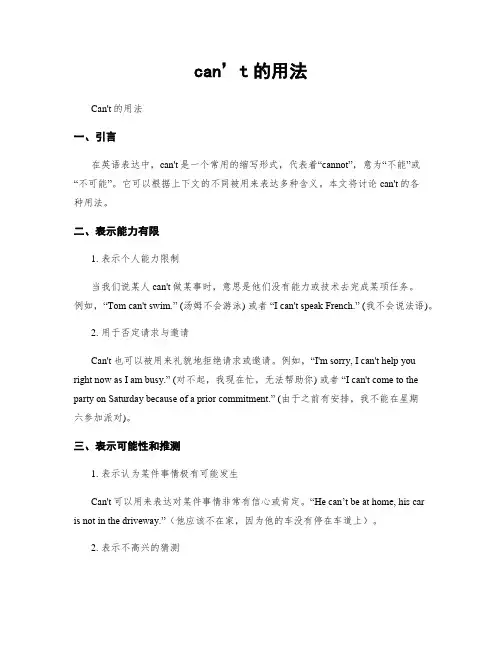
can’t的用法Can't的用法一、引言在英语表达中,can't是一个常用的缩写形式,代表着“cannot”,意为“不能”或“不可能”。
它可以根据上下文的不同被用来表达多种含义。
本文将讨论can't的各种用法。
二、表示能力有限1. 表示个人能力限制当我们说某人can't做某事时,意思是他们没有能力或技术去完成某项任务。
例如,“Tom can't swim.” (汤姆不会游泳) 或者“I can't speak French.” (我不会说法语)。
2. 用于否定请求与邀请Can't 也可以被用来礼貌地拒绝请求或邀请。
例如,“I'm sorry, I can't help you right now as I am busy.” (对不起,我现在忙,无法帮助你) 或者“I can't come to the party on Saturday because of a prior commitment.” (由于之前有安排,我不能在星期六参加派对)。
三、表示可能性和推测1. 表示认为某件事情极有可能发生Can't可以用来表达对某件事情非常有信心或肯定。
“He can’t be a t home, his caris not in the driveway.”(他应该不在家,因为他的车没有停在车道上)。
2. 表示不高兴的猜测与情态动词“must”所表示的强烈推测相对,can't用来表示某件事情几乎不可能发生。
“He can’t have finished painting the house, he only started yesterday.”(他应该还没有粉刷完整个房子,因为他昨天才开始)。
3. 表示不可能或不符合逻辑Can't可以用来表达某些事物或理论是不可能的,违反逻辑规律。
例如,“It can't rain today because there are no clouds in the sky.” (今天不可能下雨,因为天空中没有云) 或“She can't be both in London and New York at the same time.” (她不能同时存在于伦敦和纽约)。
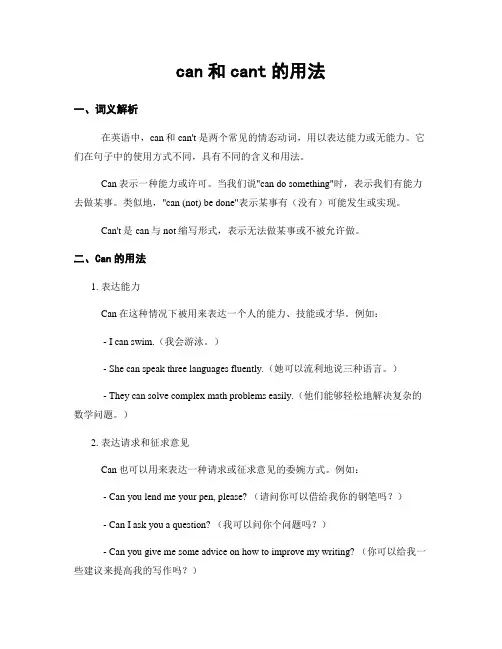
can和cant的用法一、词义解析在英语中,can和can't 是两个常见的情态动词,用以表达能力或无能力。
它们在句子中的使用方式不同,具有不同的含义和用法。
Can表示一种能力或许可。
当我们说"can do something"时,表示我们有能力去做某事。
类似地,"can (not) be done"表示某事有(没有)可能发生或实现。
Can't是can与not缩写形式,表示无法做某事或不被允许做。
二、Can的用法1. 表达能力Can在这种情况下被用来表达一个人的能力、技能或才华。
例如:- I can swim.(我会游泳。
)- She can speak three languages fluently.(她可以流利地说三种语言。
)- They can solve complex math problems easily.(他们能够轻松地解决复杂的数学问题。
)2. 表达请求和征求意见Can也可以用来表达一种请求或征求意见的委婉方式。
例如:- Can you lend me your pen, please? (请问你可以借给我你的钢笔吗?)- Can I ask you a question? (我可以问你个问题吗?)- Can you give me some advice on how to improve my writing? (你可以给我一些建议来提高我的写作吗?)3. 表示可能性和推测Can还可以用于表示某种可能性和推测。
例如:- It can get very hot in the summer. (夏天可能会变得很热。
)- The package can be delivered tomorrow. (包裹可能会在明天送达。
)- She can be quite shy when she meets new people. (她在遇到新人时可能会很害羞。
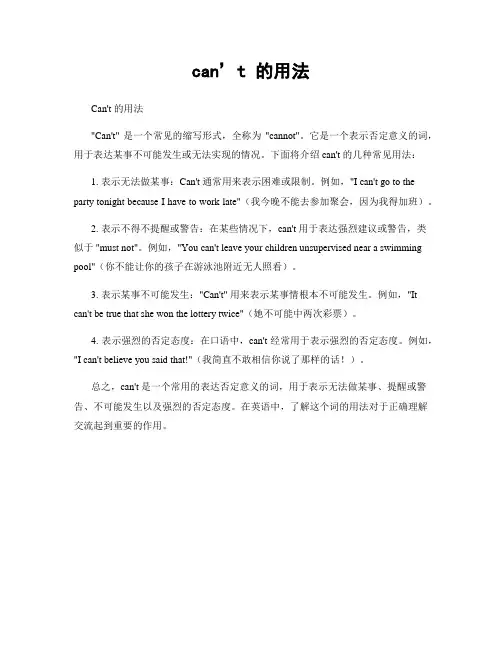
can’t 的用法Can't 的用法"Can't" 是一个常见的缩写形式,全称为"cannot"。
它是一个表示否定意义的词,用于表达某事不可能发生或无法实现的情况。
下面将介绍 can't 的几种常见用法:1. 表示无法做某事:Can't 通常用来表示困难或限制。
例如,"I can't go to the party tonight because I have to work late"(我今晚不能去参加聚会,因为我得加班)。
2. 表示不得不提醒或警告:在某些情况下,can't 用于表达强烈建议或警告,类似于 "must not"。
例如,"You can't leave your children unsupervised near a swimming pool"(你不能让你的孩子在游泳池附近无人照看)。
3. 表示某事不可能发生:"Can't" 用来表示某事情根本不可能发生。
例如,"It can't be true that she won the lottery twice"(她不可能中两次彩票)。
4. 表示强烈的否定态度:在口语中,can't 经常用于表示强烈的否定态度。
例如,"I can't believe you said that!"(我简直不敢相信你说了那样的话!)。
总之,can't 是一个常用的表达否定意义的词,用于表示无法做某事、提醒或警告、不可能发生以及强烈的否定态度。
在英语中,了解这个词的用法对于正确理解交流起到重要的作用。
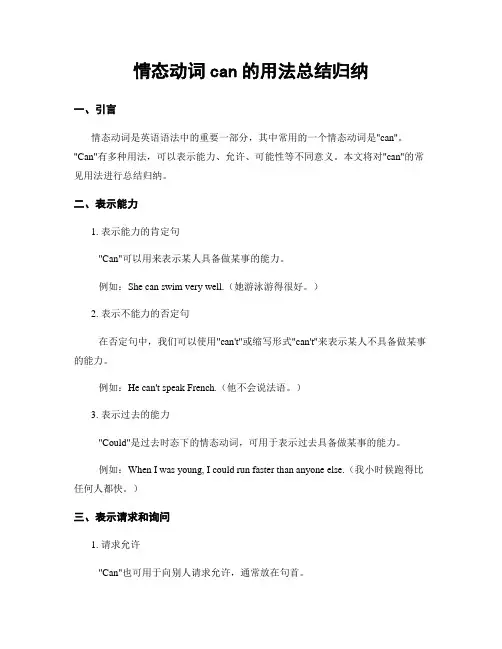
情态动词can的用法总结归纳一、引言情态动词是英语语法中的重要一部分,其中常用的一个情态动词是"can"。
"Can"有多种用法,可以表示能力、允许、可能性等不同意义。
本文将对"can"的常见用法进行总结归纳。
二、表示能力1. 表示能力的肯定句"Can"可以用来表示某人具备做某事的能力。
例如:She can swim very well.(她游泳游得很好。
)2. 表示不能力的否定句在否定句中,我们可以使用"can't"或缩写形式"can't"来表示某人不具备做某事的能力。
例如:He can't speak French.(他不会说法语。
)3. 表示过去的能力"Could"是过去时态下的情态动词,可用于表示过去具备做某事的能力。
例如:When I was young, I could run faster than anyone else.(我小时候跑得比任何人都快。
)三、表示请求和询问1. 请求允许"Can"也可用于向别人请求允许,通常放在句首。
例如:Can I borrow your pen, please?(我可以借你的笔吗?)2. 询问能力或可能性"Can"还可以用来询问某人的能力或可能性,并通常放在句首。
例如:Can you play the piano?(你会弹钢琴吗?)四、表示推断和可能性1. 表示推测"Can"也可以用来表示进行推测,即根据当前的情况作出某种判断。
例如:It can't be true!(这不可能是真的!)2. 表示可能性"Can"还可以用于表示某事有可能发生。
例如:The bus can arrive late sometimes.(公交车有时会晚点。
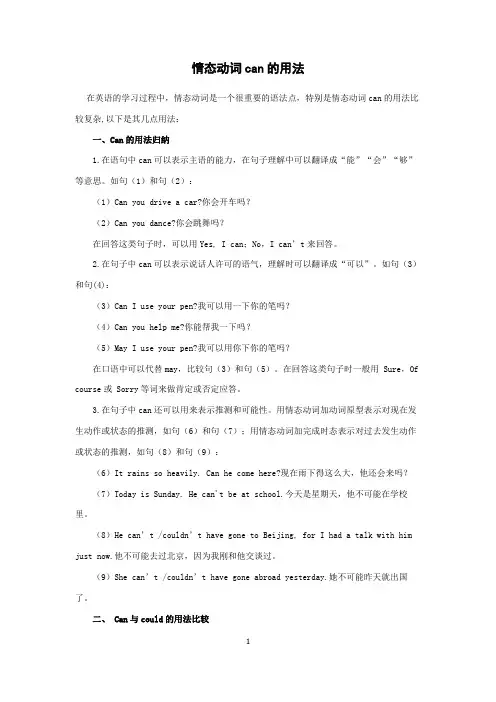
情态动词can的用法在英语的学习过程中,情态动词是一个很重要的语法点,特别是情态动词can的用法比较复杂,以下是其几点用法:一、Can的用法归纳1.在语句中can可以表示主语的能力,在句子理解中可以翻译成“能”“会”“够”等意思。
如句(1)和句(2):(1)Can you drive a car?你会开车吗?(2)Can you dance?你会跳舞吗?在回答这类句子时,可以用Yes, I can;No,I can’t来回答。
2.在句子中can可以表示说话人许可的语气,理解时可以翻译成“可以”。
如句(3)和句(4):(3)Can I use your pen?我可以用一下你的笔吗?(4)Can you help me?你能帮我一下吗?(5)May I use your pen?我可以用你下你的笔吗?在口语中可以代替may,比较句(3)和句(5)。
在回答这类句子时一般用 Sure,Of course或 Sorry等词来做肯定或否定应答。
3.在句子中can还可以用来表示推测和可能性。
用情态动词加动词原型表示对现在发生动作或状态的推测,如句(6)和句(7);用情态动词加完成时态表示对过去发生动作或状态的推测,如句(8)和句(9):(6)It rains so heavily. Can he come here?现在雨下得这么大,他还会来吗?(7)Today is Sunday. He can't be at school.今天是星期天,他不可能在学校里。
(8)He can’t /couldn’t have gone to Beijing, for I had a talk with him just now.他不可能去过北京,因为我刚和他交谈过。
(9)She can’t /couldn’t have gone abroad yesterday.她不可能昨天就出国了。
二、 Can与could的用法比较1.表许可Could可以表示为can的过去式,但用在表示许可情况下,could不表示过去式,只表示语气更加委婉、客气,如句(10)和句(11)表达的就比句(3)和句(4)更可气委婉。
can't的短语1.Can't stop, won't stop.2.Can't touch this.3.Can't fight the feeling.4.Can't stop the music.5.Can't help falling in love.6.Can't get enough.7.Can't stop the beat.8.Can't stop smiling.9.Can't resist temptation.10.Can't control myself.11.Can't live without you.12.Can't stop thinking about it.13.Can't find the words.14.Can't stop the sun from shining.15.Can't believe my luck.16.Can't resist the urge.17.Can't keep calm.18.Can't wait any longer.19.Can't get it out of my head.20.Can't stop the feeling.21.can't stop, won't stop22.can't resist the temptation23.can't escape the feeling24.can't help but smile25.can't say no to chocolate26.can't wait for the weekend27.can't get enough of you28.can't stop dreaming29.can't kick this bad habit30.can't handle the truth31.can't hide my excitement32.can't live without coffee33.can't resist a good sale34.can't see the forest for the trees35.can't turn back time36.can't hold back the tears37.can't break this cycle38.can't bear to be apart39.can't shake this feeling40.can't stop the music41.can't get enough42.can't stop won't stop43.can't resist44.can't hold back45.can't live without46.can't escape47.can't deny48.can't break free49.can't hide50.can't control51.can't forget52.can't help but53.can't bear54.can't resist temptation55.can't shake the feeling56.can't let go57.can't deny the truth58.can't ignore59.can't withstand60.can't fight the urge61.can't stay away62.can't ignore the signs63.can't escape the memories64.can't resist the charm65.can't overcome the obstacles66.can't break the habit67.can't shake the doubt68.can't hide the emotions69.can't deny the connection70.can't resist the temptation71.can't hold back the tears72.can't control the desire73.can't escape the past74.can't deny the impact75.can't resist the beauty76.can't help but smile77.can't ignore the feelings78.can't withstand the pressure79.can't fight the feeling80.can't forget the memories81.Can't stop, won't stop.82.Can't wait for the weekend to come.83.Can't resist a good challenge.84.Can't seem to find the right words to say.85.Can't shake off this feeling of déjàvu.86.Can't help but feel a sense of excitement.87.Can't get that song out of my head.88.Can't get enough of this new hobby.89.Can't believe how fast time flies.90.Can't make up my mind about what to do next.91.Can't handle the pressure anymore.92.Can't turn back now, only forward.93.Can't help but laugh at this situation.94.Can't control my emotions right now.95.Can't resist the temptation to indulge.96.Can't find the motivation to get started.97.Can't stop thinking about what could have been.98.Can't sleep, too many thoughts racing in my mind.99.Can't let fear hold me back from chasing my dreams. 100.Can't imagine my life without taking risks.101.Can't see the forest for the trees.102.Can't teach an old dog new tricks.103.Can't stand the heat, get out of the kitchen. 104.Can't stomach it.105.Can't tell a book by its cover.106.Can't win for losing.107.Can't wish away the rain.108.Can't put the genie back in the bottle.109.Can't shake it off.110.Can't move a mountain.111.Can't swim against the current.112.Can't fight fire with fire.113.Can't judge a book by its cover.114.Can't light a match in a dark room.115.Can't see the forest through the trees.116.Can't paint a picture without a canvas.117.Can't clap with one hand.118.Can't dance to the beat of a different drum.119.Can't talk the talk if you can't walk the walk.120.Can't climb a ladder with your hands in your pockets. 121.can't buy me love122.can't take my eyes off you123.can't stand the heat124.can't resist temptation125.can't find the words126.can't escape reality127.can't help but smile128.can't get enough129.can't go back now130.can't believe my luck131.can't shake the feeling132.can't turn back time133.can't hold it back anymore 134.can't stop the music135.can't deny the truth136.can't break the habit137.can't hide my feelings138.can't resist the urge139.can't forgive and forget140.can't keep a secret141.can't handle the truth142.can't stop won't stop143.can't have your cake and eat it too 144.can't stop the feeling145.can't take it anymore146.can't fight the moonlight147.can't hit the broad side of a barn 148.can't find my keys149.can't keep a secret150.can't make heads or tails of it 151.can't take my eyes off of you 152.can't take the heat153.can't stomach it154.can't get enough 155.can't seem to shake it 156.can't hold a candle to 157.can't turn back time 158.can't live without you 159.can't do it alone160.can't be tamed。
cant的用法总结归纳一、"Can't"的常见用法总结归纳"Can't" 是一个常用的缩写形式,是助动词 "can not" 的缩写形式。
它在英语中有多种用法和含义。
总结归纳这些用法和含义,可以帮助学习者更准确地理解并正确运用该词。
1. 表示无法或不可能做某事此时,"can't" 被用作情态动词表达自己无法或不可能做某事的意思。
例如:- I can't swim.(我不会游泳。
)- It can't be true!(这不可能是真的!)2. 表示禁止或不允许"Can't" 也可表示禁止或不允许做某事。
例如:- You can't smoke in this area.(在这个区域内不能吸烟。
)- Employees can't use their personal phones during work hours.(员工们在工作时间内不能使用个人手机。
)3. 表示对某事的否定判断有时,“can’t” 也被用来表示对某种事物或情况的否定判断。
例如:- You can't trust everything you read online.(你不能相信你在网上看到的一切。
)- That movie can’t be as good as they say it is.(那部电影不能像他们说的那么好。
)4. 表示将来不可能发生的事情在条件句中,"can't" 可以表示某种将来不可能发生的事情。
例如:- If it doesn't rain, we can't have a picnic tomorrow.(如果明天不下雨,我们就不能去野餐。
)- If you don't study, you can't pass the exam.(如果你不学习,你就无法通过考试。
情态动词can之巴公井开创作情态动词can的基本句型1.肯定句型为:主语+can+动词原形+其它。
例如:They can play basketball.他们能打篮球。
She can dance.她会跳舞。
You can go to watch TV.你可以去看电视了。
2.否定句型为:主语+can not(can't/cannot)+动词原形+其它。
暗示"某人不克不及(不会。
不成能)做……"。
其中can't是can not的缩略式,英国多写成cannot。
例如:You cannot pass the ball like this.你不克不及像这样传球。
I can't ride a motorbike.我不会骑摩托车。
3.疑问句句型分为:一般疑问句句型和特殊疑问句句型两种类型。
⑴一般疑问句句型为:Can+主语+动词原形+其它。
暗示"某人会(能。
可以)做……吗?",用于口语时,常暗示请求或许可。
其肯定答语用""Yes,主语+can."作答;否定答语用"No,主语+can't."作答。
注意答语中作主语的人称代词,应根据问句中的主语作相应的变更。
其变更规则为:第一人称问,则第二人称答;第二人称问,则第一人称答;第三人称问,第三人称答。
例如:①-Can you sing an English song for us?你可以为我们大家唱一首英语歌吗?-Yes.行。
(注意在Yes后面常省略I can)②-Can I skate?我可以滑冰吗?-Yes, you can.可以。
③-Can she climb hills?她能爬山吗?-No, she can't.不,她不克不及。
⑵特殊疑问句句型为:a. Who+can+动词原形+其它。
该句型中who相当于主语。
例如:-Who can sing in English in your class?你们班上谁会用英语唱歌?-Lily can.莉莉会。
情态动词口诀顺口溜以下是一个关于情态动词的口诀顺口溜:情态动词很重要,用法需要记心上。
Can 表能力或请求,Could 过去也能用。
May 表许可或可能,Might 委婉语气柔。
Must 必须或肯定,Shall 一三人称建议。
Should 应该或竟然,Will 将来或意愿。
Would 过去将来时,虚拟语气也常用。
记清意思和用法,情态动词不发愁。
以下是一个关于情态动词的口诀顺口溜,希望对你有所帮助:情态动词有 can、could、may、might、must、shall、should、will、would,用法需记牢。
can 表能力,could 表过去,may 表许可,might 表委婉。
must 表必须,shall 用于一三人称表建议,should 表应该,will 表将来,would 表过去将来。
记清意思和用法,情态动词不再难。
除了上面提到的用法,情态动词还有以下几种常见用法:1. 表示推测:情态动词可以表示对过去、现在或将来的推测。
例如:- He must be at home.(他一定在家。
)- She may come tomorrow.(她可能明天来。
)- They could have finished the work.(他们可能已经完成了工作。
)2. 表示虚拟语气:在虚拟语气中,情态动词表示与事实相反的情况。
例如:- If I were you, I would study harder.(如果我是你,我会更努力学习。
)- He could have passed the exam if he had studied harder.(如果他学习更努力,他本来可以通过考试的。
)3. 表示习惯或倾向:情态动词可以表示习惯或倾向。
例如:- He often goes to the gym.(他经常去健身房。
)- She will sit in the front row.(她会坐在前排。
情态动词can的用法总结情态动词是英语语法中的一个重要部分,而“can”是其中最常用的一个。
“can”有着丰富的用法,下面让我们来详细总结一下。
“can”最基本的意思是“能够;会”,表示某人具备做某事的能力或有做某事的可能性。
比如:“I can speak English”(我会说英语。
)在这个句子中,“can”表明“我”具备说英语的能力。
“can”用于否定句时,表示“不能;不会”。
例如:“She can't swim”(她不会游泳。
)这里清晰地表达了“她”没有游泳这项技能。
在疑问句中,“Can you?” 用于询问对方是否能够做某事。
像“Can you help me?”(你能帮我吗?)就是在请求对方提供帮助,询问对方是否有能力帮忙。
“can”还可以表示“许可;允许”,常用于口语中。
比如:“You can go now”(你现在可以走了。
)这意味着给予了对方离开的许可。
当我们想要表达“某人有可能做某事”时,也可以用“can”。
比如:“It can be very cold in winter here”(这里冬天可能会很冷。
)这里的“can”不是指能力,而是表示存在某种可能性。
“can”还有“有时会;偶尔会”的意思。
例如:“It can be quite windy in spring”(春天有时风会很大。
)“can”与“be able to”在很多情况下意思相近,但也有一些细微的区别。
“be able to”更强调通过努力或克服困难后具备的能力,并且有更多的时态变化。
而“can”则更侧重于一般的能力和可能性。
例如:“After a lot of practice, he was able to swim across the river”(经过大量练习,他能够游过那条河。
)这里用“was able to”强调了通过练习才获得的能力。
而“can”一般不用来表示过去特定的某一次能力,若要表示过去的能力,通常用“could”。
英语情态动词的常用用法归纳在英语的动词当中,凡是用来刻画人的情感动作的动词,我们称之为情态动词,情态动词有着具体的汉语意思。
但却不能独立作谓语和后面的行为动词一起构成和成谓语。
在英语的动词当中,凡是用来刻画人的情感动作的动词,我们称之为情态动词,情态动词有着具体的汉语意思。
但却不能独立作谓语和后面的行为动词一起构成和成谓语。
区别于其他的行为动词,情态动词没有人称和数的变化,有少数的时态现象——一般时、过去时、将来时等。
一.Can1、can表示说话人的能力,常译作能、能够、会。
eg:I can speak English very well.Can you swim across the river? Yes, I can/ No, I can’t.2、 can可以用来表示说话人的客观可能性,通常应用于否定疑问句式中。
eg:People can’t live without water.Can you finish the jobs in three hours?Can this be true.3、在口语里,can表示允诺、允许、可以。
等于may,但是may的语气重于can。
eg:Can I come in? = May I come in?Can I use your bike? = May I use your bike ?*表示允许可以may mightcould can4、在“过去时”的语境里,通常用could 表示它的过去式,用be able to 短语(was/were)而could通常用来在一般现在时的语境里表示委婉语气eg:Could(can)you show me the way to the supermarket?5、 can表示猜测(1)对现在状态的一种猜测,只能用在否定疑问句中。
eg:Zhang can’t be ill really?This can’t be done by him.(2)对现在动作的猜测eg: The boy can’t be telling lies.Mary works so hard, now, she can’t be sleeping.(3)对过去动作的一种猜测eg:He can’t have gone to the bookshop yesterday.Mother couldn’t have said it.6、 can(could)惯用法(1)can’t wait to do 迫不及待做…….eg: Children can’t wait to eat apples in the basket.(2)can’t help doing 情不自禁做某事。
口语点津:情态动词can't 的10个习惯表达
In English grammar the modal verb “can”and its opposite “cannot or can’t” is explained as a verb that we use to describe ability or the lack of it. For example, I can play tennis or I cannot swim.
在英语语法中,情态动词"can"和它的否定形式"can't"分别用来描述拥有某种能力和缺乏某种能力,比如"I can play tennis."(我会打网球。
)或者" I cannot swim."(我不会游泳。
)In question form it can be used to ask permission, for example, “Can I leave early today?” or as a challenge –“Why can’t I have another biscuit?”
在疑问句中,"can"和"can't"用于征得同意,比如“Can I leave early today?”(“我今天可以提前走吗?”)或者可用于表达挑衅意味,如“Why can’t I have another biscuit?”(“我为什么不能再吃一块饼干?”)
Can’t (or cannot) is also used with some verbs to create idiomatic expressions and are widely used by native English speakers.
"can't"(或"can not")也常常和一些动词连用,在英语中是常用的习惯表达。
1. can’t wait –to be excited about something
1.迫不及待要做某事
e.g. I can’t wait to see my friends next week. It’s going to be wonderful. 例:下周要见我的朋友们啦,我已经迫不及待了,一定会很棒的。
2. can’t stand – to strongly dislike something
2. 厌恶某物
e.g. I can’t stand the traffic in London.
例:我简直不能忍受伦敦的交通。
3. can’t bear – to strongly dislike something because it makes you unhappy
3. 因为某件东西令你难以忍受而讨厌
e.g. She can’t bear to be away from her family longer than a week.
例:她不能忍受离开家人超过一个星期
4. can’t take it – cannot tolerate something
4. 不能忍受某事
e.g. I can’t take his constant shouting anymore. I have to leave.
例:我受不了他一直大叫了,我要走了。
5. can’t be bothered – to have no interest in something
5. 对某事没兴趣
e.g. I know I should go for a run but I can’t be bothered tonight.
例:我知道我该去跑步了,但是今天晚上我就是提不起兴趣。
6. can’t take my eyes off her/him – to be attracted to someone
6. 被某人吸引
e.g. Simon can’t seem to take his eyes off the new Marketing assistant. 例:西蒙被新来的市场助理深深吸引了。
7. can’t win – life is difficult
7. 生活艰辛
e.g. Sometimes no matter what you do in life, you can’t win.
例:有时候无论你做什么,生活都是一样的艰辛。
8. can’t help it – to have no control over something
8. 忍不住做某事
e.g. I can’t help it, I find chocolate digestives irresistible!
例:我就是忍不住,巧克力太难拒绝了!
9. can’t think straight – cannot concentrate
9. 不能集中
e.g. I am so tired that I can’t think straight.
例:我太累了,注意力无法集中。
10. can’t hear myself think – cannot concentrate
10. 不能集中
e.g. There is so much noise here that I can’t hear myself think.
例:这里太吵了,我不能集中思考了。
last monday, my father would be on a 1 (busy)trip for five days. having gotten my promise of being great at home and taking care of my mother, he rest assured and put his luggage into the trunk of his car. ____2____(see) my father’s driving away, my mother and i waved our hands and said goodbye to him. for a moment, i began to miss my father, ____3_____(wish) that he would be safe and well the next days i thought everything would go well, as this was not the first time that my father _____4____(be)away for several days. yet, —____5_____(fortunate), my mother caught a cold the next morning. looking at her pale face, i _____6______(experience) high levels of anxiety. however, i told myself that i had to calm down and look after my mum, ____7_____i promised to my dad. the moment i got my mum to sleep, i put cold towel on her forehead, found pills in the medicine box, and made some noodles for her. luckily, she woke up and felt ____8_____(good), after taking the pills and the noodles. _____9_____her fever was gone relieved and satisfied me a lot. in the next four days, i was taking her body temperature twice a day, ensuring that she was completely well. to our delight, my dad went back home safely and healthily on saturday. on hearing _____10____i had done to my mum, he, as well as my mum, beamed at me and gave me a big thumb. hearing their praises and seeing bright smiles on their faces, i really felt overjoyed and thrilled. conceivably, taking care of my parents was, indeed and definitely, my mission and obligation。